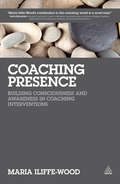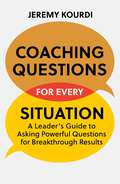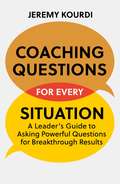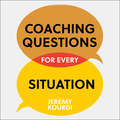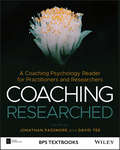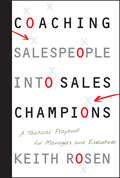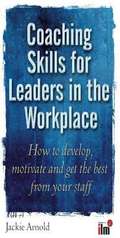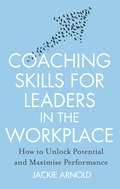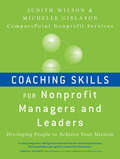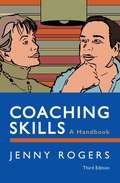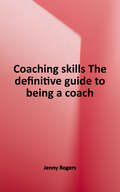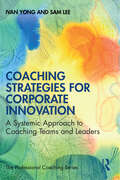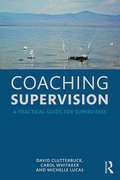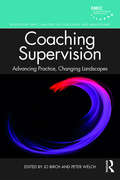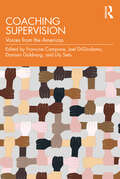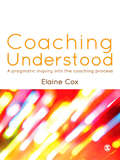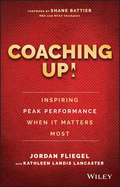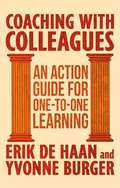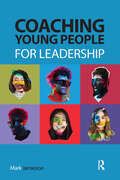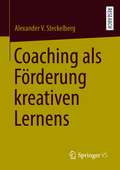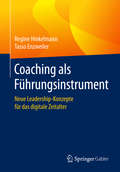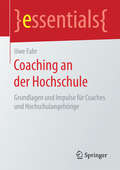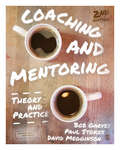- Table View
- List View
Coaching Presence
by Maria Iliffe-WoodOne of the hallmarks of maturity as a coach is awareness of how your values, beliefs, and other factors affect your coaching interventions. It takes skill to notice these influences which can manifest both physically and mentally during coaching, while simultaneously ensuring a client focused approach. Coaching Presence examines how self-awareness can be built across key aspects of coaching practice, introducing a model that will help you make a conscious and deliberate choice for every approach or intervention that you use with your client. It explores how, by paying close attention to the motivations behind every coaching choice, you can minimize the unconscious negative influences and bias to produce the best outcome for the client and their wider system. It will also help you recognize when conscious visibility expressed explicitly to the client may actually be the best coaching solution.
Coaching Presence: Building Consciousness and Awareness in Coaching Interventions
by Maria Iliffe-WoodOne of the hallmarks of maturity as a coach is awareness of how your values, beliefs, and other factors affect your coaching interventions. It takes skill to notice these influences which can manifest both physically and mentally during coaching, while simultaneously ensuring a client focused approach. Coaching Presence examines how self-awareness can be built across key aspects of coaching practice, introducing a model that will help you make a conscious and deliberate choice for every approach or intervention that you use with your client. It explores how, by paying close attention to the motivations behind every coaching choice, you can minimize the unconscious negative influences and bias to produce the best outcome for the client and their wider system. It will also help you recognize when conscious visibility expressed explicitly to the client may actually be the best coaching solution. An online supporting resource includes a 'Leader as Mediator' white paper.
Coaching Questions for Every Situation
by Jeremy KourdiPowerful coaching questions to get the best out of any situation.In coaching, questions are the route to progress. Questions enable the people being coached to arrive at their own solutions and, crucially, to 'own' them as well. The effectiveness of this tool applies to anyone in a coaching role, whether as a leader, a professional coach, or a people management executive. A good question, asked at the right moment, can be transformative. Great questions allow coaches to influence, develop and shape someone's thinking far beyond that of their own knowledge or area of expertise, propelling the learner to new levels of insight, awareness, action and effectiveness. Coaching Questions for Every Situation delivers bags of context-specific questions to leaders and coaches right when they need them most, equipping them with the essential tools to deal with a difficult situation, raise performance or offer a moment of motivation. It includes sections on both virtual coaching and coaching across cultures.The book explains the guiding principles behind great questions as well as the pitfalls to avoid, serving as a practical guide to becoming a highly effective questioner.
Coaching Questions for Every Situation: A Leader's Guide to Asking Powerful Questions for Breakthrough Results
by Jeremy Kourdi**Powerful coaching questions to get the best out of any situation.**In coaching, questions are the route to progress. Questions enable the people being coached to arrive at their own solutions and, crucially, to 'own' them as well. The effectiveness of this tool applies to anyone in a coaching role, whether as a leader, a professional coach, or a people management executive. A good question, asked at the right moment, can be transformative. Great questions allow coaches to influence, develop and shape someone's thinking far beyond that of their own knowledge or area of expertise, propelling the learner to new levels of insight, awareness, action and effectiveness. Coaching Questions for Every Situation delivers bags of context-specific questions to leaders and coaches right when they need them most, equipping them with the essential tools to deal with a difficult situation, raise performance or offer a moment of motivation. It includes sections on both virtual coaching and coaching across cultures.The book explains the guiding principles behind great questions as well as the pitfalls to avoid, serving as a practical guide to becoming a highly effective questioner.
Coaching Questions for Every Situation: A Leader's Guide to Asking Powerful Questions for Breakthrough Results
by Jeremy Kourdi**Powerful coaching questions to get the best out of any situation.**In coaching, questions are the route to progress. Questions enable the people being coached to arrive at their own solutions and, crucially, to 'own' them as well. The effectiveness of this tool applies to anyone in a coaching role, whether as a leader, a professional coach, or a people management executive. A good question, asked at the right moment, can be transformative. Great questions allow coaches to influence, develop and shape someone's thinking far beyond that of their own knowledge or area of expertise, propelling the learner to new levels of insight, awareness, action and effectiveness. Coaching Questions for Every Situation delivers bags of context-specific questions to leaders and coaches right when they need them most, equipping them with the essential tools to deal with a difficult situation, raise performance or offer a moment of motivation. It includes sections on both virtual coaching and coaching across cultures.The audiobook explains the guiding principles behind great questions as well as the pitfalls to avoid, serving as a practical guide to becoming a highly effective questioner.(P) 2021 Hodder & Stoughton Limited
Coaching Researched: A Coaching Psychology Reader for Practitioners and Researchers (BPS Textbooks in Psychology)
by Jonathan Passmore David TeeA comprehensive review of the practice and most recent research on coaching Coaching Researched: Using Coaching Psychology to Inform Your Research and Practice brings together in one authoritative volume a collection to the most noteworthy papers from the past 15 years from the journal International Coaching Psychology Review. Firmly grounded in evidence-based practice, the writings are appropriate for the burgeoning number of coaching researchers and practitioners in business, health, and education. The contributors offer a scientific framework to support coaching’s pedagogy and they cover the sub-specialties of the practice including executive, health, and life coaching. The book provides a comparative analysis in order to differentiate coaching from other practices. Comprehensive in scope, the book covers a wide-range of topics including: the nature of coaching, coaching theory, insights from recent research, a review of various coaching methods, and thoughts on the future of coaching. This important book: Offers a collection of the most relevant research in the last 15 years with commentary from the International Coaching Psychology Review journal’s chief editor Contains information on both the theory and practice of the profession Includes content on topics such as clients and coaching, an integrated model of coaching, evidence-based life coaching, and much more Presents insights on the future of coaching research Written for students, researchers, practitioners of coaching in all areas of practice, Coaching Researched offers an accessible volume to the most current evidenced-based practice and research.
Coaching Salespeople into Sales Champions: A Tactical Playbook for Managers and Executives
by Keith RosenHow many salespeople (and managers) are not realizing their fullest potential? What stands in the way to greater performance isn't something they don't have but something they don't get consistently: effective coaching. Unfortunately; most managers don't deliver consistent, effective coaching or have the coaching skills needed to make a long term, positive impact on their salespeople's performance. They act as Chief Problem Solvers and get far too involved in fixing their people's problems; then get frustrated about their salespeople's inability to improve. Coaching Salespeople into Sales Champions provides a proven coaching framework used by the world's leading sales organizations so that managers can confidently facilitative powerful, engaging coaching conversations that help you reach your business objectives - faster and win more sales today. Winner of 6 International Best Book Awards, this book has already been endorsed by dozens of top sales organizations such as Microsoft, Oracle, Google, American Express, IBM, PepsiCo, The New York Rangers, The New York Knicks and thought leaders including Brian Tracy, Ziglar, Tom Hopkins, Denis Waitley and Tony Alessandra, Tony Parinello and Jill Konrath as the number one book on sales coaching and management coach training. Sales training alone is not enough. Your people can't always diagnose their own skill deficiencies, nor can they coach themselves out of a slump. Managers focus on spreadsheets and treat symptoms instead of uncovering the root cause, so similar problems persist. Good coaching taps into people's individuality and motivation, builds confidence & fosters deeper accountability.
Coaching Skills Leaders in the Workplace
by Jackie ArnoldThis book provides instruction on the requirements for the Institute of Leadership and Management coaching & mentoring qualifications levels 5-7. As a leader, senior manager or executive, you are often required to act as a coach or mentor for your staff. This book will enable you to set up coaching programmes that can make a significant difference to staff retention and motivation. It will give you the knowledge and skills you need to encourage your staff to grow so that you can get on with your own essential leadership role. In this book you'll discover how to: - become an effective leader and coach *distinguish between coaching and mentoring - establish the right coaching climate *develop effective communication skills - set up the first coaching session *present a business case for coaching ...and much more. You'll also find out the various coaching models available and equip yourself with useful tools and exercises that you can employ in your coaching sessions.
Coaching Skills for Leaders in the Workplace, Revised Edition: How to unlock potential and maximise performance
by Jackie ArnoldThis book will give you the knowledge and skills to understand the differences between coaching, supervision & mentoring. It will demonstrate how effective coaching programmes can enhance behaviours and retain key staff. How it can reduce recruitment costs, promote well-being and give a robust return on investment. It offers leaders and managers proven behaviours, coaching and supervision models and techniques that can be adapted for any environment. It supports the requirements for the ILM and CMI Coaching and Mentoring in Management Qualifications at levels 5 and 7. The book includes:Comparison of effective leadership styles and application, establishing the right conditions and climate for coaching, overcoming the barriers to coaching and /or supervision, enhancing communication and workplace understanding and presenting a clear business case for coaching & supervision.
Coaching Skills for Nonprofit Managers and Leaders
by Judith Wilson Michelle GislasonThe only nonprofit orientation to coaching skills available, Coaching Skills for Nonprofit Leaders will provide nonprofit managers with an understanding of why and how to coach, how to initiate coaching in specific situations, how to make coaching really work, and how to refine coaching for long-term success.Coaching Skills for Nonprofit Leaders offers practical steps for coaching leaders to greatness and complements the academic and theoretical work in nonprofit leadership theory. The book can be used by the coaching novice as a thorough topical overview or by those more experienced with coaching as a quick reference or refresher.Based on the Inquiry Based Coaching? approach, Coaching Skills will strengthen and expand the reader?s ability to drive organization mission, while retaining the intrinsic values of the nonprofit culture and working towards outcomes that create a culture of discipline and accountability and empower others to be even more responsible, accountable, and self-motivated. This book uses accessible language, examples, case studies, key questions, and exercises to help: Promote better relationships Know when to delegate, direct and coach. Balance directive and supportive styles of leadership for productive partnerships Overcome fears and deal head-on with difficult situations and conflict. Use coaching for performance improvement and on-the-job development. Support independent thinking and personal reflection Gain commitment and accountability from others and build teams
Coaching Skills: A Handbook (Third Edition)
by Jenny Rogers<p>Coaching Skills is a popular text for coach training schools all over the world, brought to life with dozens of case studies and practical guidance, while also emphasizing the importance of underpinning psychological awareness and understanding. <p>This book will support you whether you are an experienced coach working with senior executives, or a beginner taking your first steps on the journey to becoming a master-practitioner. <p>Now includes new material on: coaching and the human brain, working with clients on their self-limiting beliefs, new models of understanding what coaching is and being a coach during the psychological stresses of a severe economic recession.
Coaching Skills: The Definitive Guide to being a Coach
by Jenny RogersThis book will support you whether you are an experienced coach working with senior executives, or a beginner taking your first steps on the journey to becoming a master practitioner.
Coaching Strategies for Corporate Innovation: A Systemic Approach to Coaching Teams and Leaders (The Professional Coaching Series)
by Sam Lee Ivan YongDrawing upon the authors' own extensive experiences within the field, and melding startup dynamics with corporate innovation, the book equips readers to navigate the complexities of this emerging innovation practice.Collaboration between large corporations and innovative startups represents a strategic pillar of corporate innovation and is growing at a rapid pace globally. Such engagements are situated within the broader paradigm of open innovation and are categorised explicitly as corporate venturing when they involve mechanisms such as strategic investments, partnerships, incubators, or co-development initiatives. Leveraging the authors’ extensive experience in startup investment, mentorship, and corporate innovation thought leadership forums, this book addresses the critical need for innovation coaching strategies to succeed in this dynamic corporate-startup collaboration. Through a synergy of practical insights, riveting case studies, and authoritative thought leadership, readers will be guided on a transformative journey encompassing innovation culture, symbiotic partnerships with startups, and the coaching strategies pivotal for unlocking innovation advantage.This book is tailored for corporate leaders, innovation teams, corporate venture capitalists, and professional coaches aspiring to transcend conventional wisdom in the current corporate innovation practices.
Coaching Students in Higher Education: A Solution-Focused Approach to Retention, Performance and Wellbeing
by May Sok Mui Lim Nadya Shaznay Patel Ramesh ShahdadpuriThis practical guide for educators in higher education encourages readers to ask effective coaching questions and apply relevant coaching techniques to empower and engage students to grow and perform at their best.Filled with authentic examples and handy tips, the book takes readers from the ‘how to’ of coaching, through the practicalities, challenges and honing of existing skills and new capabilities. The authors recognise that in educators’ daily encounters and interactions with students, there are many timely coachable moments for authentic learning. These opportunities can enable students to learn beyond what is squarely in their curriculum and develop their own pathways to become work-ready graduates. Through coaching, educators help students discover more about themselves while guiding them to innovate and generate solutions to perceived and real-world problems. This guide offers in depth discussions along with tools and tips to provide invaluable guidance for educators to get acquainted with the key skills needed to coach students for success in various academic and professional contexts. The content covers multiple varied scenarios, from classrooms and assignments, to internships and group work, and highlights various coaching opportunities with practical strategies.This is a resourceful text for educators, teachers and professionals working in higher education and learning institutions. It provides training material for institutions that want to conduct faculty development programmes to prepare educators for effective coaching conversations in their universities.
Coaching Supervision: A Practical Guide for Supervisees
by David Clutterbuck Carol Whitaker Michelle LucasJust like the coaching relationship, supervision is most successful when it is a collaborative endeavour, with both parties clear on their roles and the process. Coaching Supervision is an intensely practical book providing guidance on when, why and how to seek supervision, and on how coaches can make the most of the supervision they receive. Written by experienced supervisors who have a deep understanding of the field, and drawing on research into good practice internationally, this book: Explains what supervision is and how it differs from other ‘helping conversations’ Provides a step by step approach to choosing a supervisor Advises on how to structure the coach/mentor development journey Explores a breadth of activities that enhance reflective practice Shows how supervision is an integral element of professional coaching and mentoring This practical guide will be vital reading for all established and trainee coaches and mentors participating in the supervision process, either as supervisors or supervisees.
Coaching Supervision: Advancing Practice, Changing Landscapes (Routledge EMCC Masters in Coaching and Mentoring)
by Jo Birch Peter WelchCoaching and mentoring supervision is a rapidly expanding field. This book is a curated collection of contemporary thinking; presenting cutting-edge contributions from international writers, leaders in the professional field, academics and practitioners who offer a range of accessible applied research, practice examples, case studies, guidelines and reflective prompts to readers. As in art galleries, some pieces require reflection – and return visits may be necessary. The work is edgy and new, and yet totally grounded in the coaching and mentoring supervisor experience, bringing pragmatic solutions to current complex challenges. Over the last decade coaching supervision has moved from a rare and privileged audience to being common place amongst ‘best practice’ coaches. This book harnesses the current surge in curiosity, knowledge and practice in coaching and mentoring supervision and provides a collective statement of our times. Each chapter, in its highly individual way, equips us to face the demands of the VUCA environment. In turn, the book resources coaching and mentoring supervisors to support their supervisees – coaches and mentors who work with leaders, grappling with global, community and personal challenges, in this uncertain, fast moving world. Supervision for mentors is developing alongside coaching supervision and at present there appears to be no obvious distinctions with little current research focussing on the mentoring supervision experience. However, its distinctive identity is still forming. We invite mentors, and mentor supervisors, as they read these works, to consider the emerging similarities and differences in addressing requirements for mentoring supervision. The book brings together pioneering research and practice and as such will remain current for many years. This book will be popular with experienced professionals who want to stretch and deepen their practice, keep up-to-date with current studies, challenge and catalyse their own thinking, and embrace learning from real-world practitioner examples and applied research.
Coaching Supervision: Voices from the Americas
by Francine Campone Joel DiGirolamo Damian Goldvarg Lily SetoThis edited collection brings together an impressive and international array of coaching supervisors to highlight the unique cultural and contextual aspects of coaching supervision in the Americas, exploring current theory, research, and practice. Offering fresh insights into a growing field, Francine Campone, Joel DiGirolamo, Damian Goldvarg, and Lily Seto expertly present the nuances of coaching supervision principles and practices in the Americas. The book is organized into three parts. Part 1 introduces the range of cultures and values that inform approaches to and beliefs about coaching supervision in the Americas, such as racial justice, working with indigenous communities, and providing culturally sensitive coaching supervision. Part 2 presents adaptations of coaching supervision models and methods to align with Americas contexts, as well as uniquely introducing an original model for coaching supervision rooted in an Americas perspective. Incorporating theory with practitioner’s experiences throughout, Part 3 presents chapters that offers avenues for increasing awareness and interest in coaching supervision in the Americas, including chapters on coach wellbeing and the developmental journey of the coach. Coaching supervisors work across borders and boundaries, and this book will extend supervisors’ understanding of the various contexts in which they are working. It is essential reading for coaching supervisors, educators, trainers, mentors, and coaches, and it will be of interest to practitioners and graduate students in organizational development and those who oversee internal coaching programs.
Coaching Understood: A Pragmatic Inquiry into the Coaching Process
by Elaine Cox′This book is a milestone in the coaching literature. Elaine Cox provides an excellent text that is scholarly, practical and accessible. She offers clear insights into how coaching works so that coaching is truly understood!′ - Bob Garvey, Professor of Business Education, York St John Business School ′The development of the coaching literature has often been protracted and modest. In recent years, few coaching texts provided a significant leap forward in our understanding of psychological dynamics of coaching. For this reason, Cox’s Coaching Understood is a game changer. More thoroughly and systematically than ever before, this work gets under the bonnet of the coaching engine and explores the mechanics of the coaching process. For anyone wondering why coaching works, this book is your answer.′ - Yossi Ives, Tag International Development, UK (International Journal of Evidence Based Coaching Mentoring) Coaching Understood takes a fresh approach to coaching skills and techniques by examining each element of the coaching process in detail in order to verify and justify its effectiveness. By exposing the mystery underlying coaching′s success as a personal and professional development intervention, Elaine Cox undertakes to generate a better understanding of coaching, improve coaching practice, and breed a new generation of more informed coachees and buyers of coaching. Coaching Understood is essential reading for students and practitioners alike.
Coaching Up! Inspiring Peak Performance When It Matters Most: Inspiring Peak Performance When It Matters Most
by Jordan FliegelConnect, engage, motivate, and inspire using top coaching techniques Coaching Up! is about inspiring those who matter to you to achieve peak performance. Whether you are a coach, a business leader, a civic activist, a teacher, a counselor, or a parent, this book will offer you a powerful, highly effective way to connect to the people you care about and move them forward toward their best selves. In sports, coaches have developed ways of connecting with their players quickly in the "heat of the battle," inspiring them to perform to their fullest potential and "leave it all on the field." Interestingly, although these techniques have not been codified, great coaches have independently developed remarkably similar models. This book aligns these techniques and distills their essence into a fundamental skill set that anyone can use to connect with, support, and inspire his or her colleagues, teammates, friends, and family members. At its foundation, great coaching is based on a solid set of techniques that can be applied to all areas of life. Essentially, those skills boil down to forging authentic connections, providing genuine support, and offering concise direction. While our everyday pressures may be less intense than those of a championship, the long-term game is even more important. Why not borrow from the best to develop the skills and abilities to win every day? Inspire and motivate people to higher performance Improve communication in high-stakes situations Be more effective both professionally and socially Getting inside the way great coaching works gives you an unparalleled glimpse at the core of inspiration. A great coach can make the difference between a mediocre player and a world champion. What would that difference look like if you could inspire every colleague in your business? Everyone who matters to you in your personal life? You can be the source of empowerment and motivation that helps the people around you reach higher, go further, and achieve more. Coaching Up! gives you the game plan—and shows you how to run the plays.
Coaching With Colleagues
by Erik De Haan Yvonne BurgerThis is the first serious, rigorous book about coaching which is deeply rooted in a long and varied therapeutical tradition and at the same time translates insights from that tradition into clear and crisp models for practical application in modern coaching practice. The book refers to well-known coaching approaches in business and devotes more attention than usual to internal coaching practices. It is a distinct, rigorous yet accessible guide to coaching approaches and practice.
Coaching Young People for Leadership
by Mark JamiesonHow to develop young people's leadership skills. A practical guide for anyone involved in nurturing, mentoring or educating young people or those interested in youth development.With the help of this book, coaches, teachers, and those working within youth organisations can apply new coaching techniques and ideas to support and fulfil the leadership potential of young people, exploring how to provide them with the skills to transition into adulthood and prepare them for leadership roles. This book introduces a three-stage coaching programme - authentication, development and ambition - as a framework for nurturing and developing young people. This book also draws on real-life case studies of leadership experiences at individual, community and societal levels as well as using reflective exercises to promote critical thinking.It emphasises the importance of acknowledging young people's roles in leadership and examines how to mentor future leaders by examining what current youth leadership looks like today and a vision for the future. It substantiates the claim that young people are an underused and underdeveloped leadership resource.
Coaching als Förderung kreativen Lernens
by Alexander V. SteckelbergIn der vorliegenden Untersuchung werden Zusammenhänge zwischen Lernen, Kreativität, Problemlösen und anderen adaptiven Prozessen geklärt und ein umfassendes Komponenten-Modell kreativen Lernens, das diese Phänomene in Einklang bringt, entwickelt. Darauf aufbauend wird die Komponenten-Theorie des Lernens im Coaching hergeleitet. Im Verlauf der Untersuchung wird nicht nur der Nachweis der prinzipiellen Möglichkeit kreativen Lernens im Coaching ohne direkte Wissensvermittlung und damit auch die Existenzberechtigung des Coachings als Profession erbracht, sondern gleichzeitig praktizierenden Coaches eine Hilfestellung zur Sicherung und Steigerung des Erfolgs ihres Coachings gegeben. Vielversprechend erscheinen die durch die vorliegende Untersuchung hergestellte Verbindung unterschiedlicher Fachdomänen sowie die Verknüpfung konstruktivistischer, prozessorientierter und systemtheoretischer Ansätze mit kognitivistischen und neuropsychologisch-orientierten Herangehensweisen.
Coaching als Führungsinstrument: Neue Leadership-Konzepte für das digitale Zeitalter
by Regine Hinkelmann Tasso EnzweilerIn digitalen Arbeitswelten, die von globalen Teams und flexiblen Arbeitszeiten und -orten geprägt sind, gewinnen Führungsqualitäten eine neue Bedeutung für den Unternehmenserfolg. Regine Hinkelmann und Tasso Enzweiler stellen zentrale Modelle des coachenden Führungsstils vor, der sich besonders dafür eignet, Mitarbeiter potenzialorientiert auch fernab des Unternehmensstandortes zu führen. Sie erläutern anschaulich, wie es mit Coaching-Interventionen gelingt, Mitarbeiter zu motivieren, Vertrauen zu schaffen und eigenverantwortliches Arbeiten zu ermöglichen. Die Autoren stellen Methoden vor, mit denen Führungskräfte die Stärken ihrer Mitarbeiter einschätzen und entwickeln können. Zudem werden Führungsherausforderungen im Change beleuchtet. Zahlreiche Beispiele und Checklisten ermöglichen die schnelle und zuverlässige Umsetzung in die Berufspraxis.
Coaching an der Hochschule: Grundlagen und Impulse für Coaches und Hochschulangehörige (essentials)
by Uwe FahrUwe Fahr gibt in diesem essential einen #65533;berblick dar#65533;ber, welchen Bedarf an Coaching Forschende und Lehrende an Hochschulen haben. Er zeigt aus der Perspektive eines Coaches auf, vor welchen Herausforderungen dieser Personenkreis steht und was es bedeutet, an einer deutschen Hochschule zu arbeiten. Praxisorientiert zeigt der Autor auf, was Coaching f#65533;r diesen Personenkreis leisten kann. Coaches erhalten Hintergrundwissen zum Coaching im Hochschulkontext.
Coaching and Mentoring
by Paul Stokes Bob Garvey David MegginsonCoaching and mentoring are fast becoming essential aspects of modern managerial practice. With this growth comes an increasing number of students embarking on mentoring and coaching courses. The authors (well respected and trusted scholars in the field) provide an authoritative text with a comprehensive overview and critical grounding in the key concepts, models and research studies in coaching and mentoring and answer important questions such as `What does coaching and mentoring involve?', `What is its value?' and `How can the added value of mentoring and coaching be demonstrated?' Examples are drawn from a variety of sectors, including private businesses, public and voluntary organizations and schools. Contemporary debates are explained and chapters include features such as case studies, research questions and helpful tips to support the reader. To gain a wider perspective, there is a chapter which provides critical comment on the state of the art in the US, while the final chapter offers the first attempt at developing a unified theory of coaching and mentoring by drawing on their respective antecedents.
